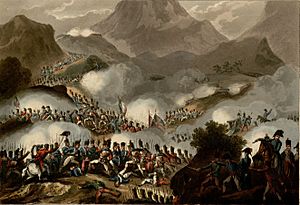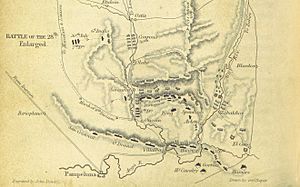Battle of Sorauren facts for kids
Quick facts for kids Battle of Sorauren |
|||||||
|---|---|---|---|---|---|---|---|
| Part of Peninsular War | |||||||
 Battle of the Pyrenees, July 28th 1813 by Thomas Sutherland |
|||||||
|
|||||||
| Belligerents | |||||||
| Commanders and leaders | |||||||
| Strength | |||||||
| 24,000 men | 30,000 men | ||||||
| Casualties and losses | |||||||
| 2,600 dead or wounded | 4,000 dead or wounded | ||||||
The Battle of Sorauren was a major fight during the Peninsular War in July 1813. It was part of a bigger series of battles called the Battle of the Pyrenees. In this battle, soldiers from Britain and Portugal worked together. Their leader was Sir Arthur Wellesley, who later became famous as the Duke of Wellington. They fought against French forces led by Marshal Jean-de-Dieu Soult. The French were trying to rescue the city of Pamplona, which was under attack by the British and Portuguese.
Why the Battle Happened
At this time, many British and Portuguese soldiers were busy attacking San Sebastián and surrounding Pamplona. This meant their forces were spread out. Marshal Soult, the new French commander, saw this as a chance to strike back. He launched a surprise attack with his Armée d'Espagne (Army of Spain). They tried to push through two mountain passes, Maya and Roncesvalles.
Even though the French had more soldiers at first, the land was very difficult to cross. The British and Portuguese soldiers also fought very bravely. This slowed down the French advance a lot.
The Main Fight at Sorauren
A large group of about 40,000 French soldiers marched towards Sorauren. They were led by generals Clausel and Reille. On July 27, the British forces at Sorauren were much smaller. They were lined up on a place called the Oricain Ridge.
Sir Arthur Wellesley rode along the ridge, and his British and Portuguese troops cheered loudly. Marshal Soult decided to wait until the next day to attack. This delay gave Wellesley time. By the time the French attacked, more British and Portuguese soldiers had arrived. This brought the total Allied force to about 24,000 men.
On July 28, the fighting on the ridge was very fierce and bloody. But the defenders held their ground against the French attacks. Around midday, more Allied soldiers from the 6th Division arrived. Wellesley sent them to attack the French on their right side. As more fresh units joined the battle, Soult realized he couldn't win. He soon ordered his troops to pull back.
The French army lost about 4,000 soldiers, either killed or wounded. Wellesley's army also suffered losses: 1,500 British, 1,000 Portuguese, and 1,000 Spanish soldiers.
On July 30, the French continued their retreat from Sorauren. They tried to get between Wellesley's army and San Sebastián. This retreat cost them another 3,500 soldiers. At a place called Beunza, 5,100 Portuguese and 4,000 British soldiers stopped another French attempt to break through.
What Happened Next
After losing so many soldiers and failing to break through, Marshal Soult lost his chance to win. He pulled his army back into France. There, he began to get ready to defend against the next attack from the Allied forces.
Images for kids
-
A painting of the Sorauren battlefield eleven years later (1824) by Edward Hawke Locker.
 | Roy Wilkins |
 | John Lewis |
 | Linda Carol Brown |



